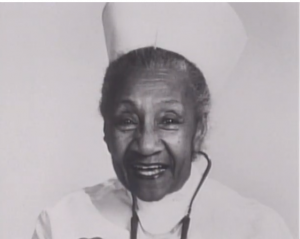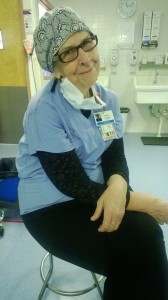
Alberta Hunter in her nurse uniform at Goldwater Memorial Hospital before her retirement in 1977
In 1955, blues and jazz legend Alberta Hunter decided to begin a second career as a nurse after reaching the pinnacle of a music and theater career spanning more than 4 decades. Yet, she was turned down when she first applied to the School of Practical Nursing at the Young Women’s Christian Association branch in Harlem. The director of the school told her that she was simply too old to become a nurse. Undaunted, she applied again, this time with a fake birth certificate and high school diploma that understated her actual age by 12 years. She then graduated from the YWCA LPN program in August 1956 and went on to work as a nurse at Goldwater Memorial Hospital in New York until she was forced by the hospital to retire in 1977 at age 82 (although the hospital staff actually thought she was 70). By all accounts, she was an excellent nurse who was adored by her patients and coworkers and whom, during her 20 years at Goldwater Memorial Hospital, never missed a single day of work or was ever late to a shift.
These days, older nurses and nursing students have it much easier than Ms. Hunter. While ageism and age discrimination is still as much of a problem in the nursing field as it is in other fields, it has clearly declined and older nurses and nursing students can expect a much more welcoming environment and workplace than they could have 60 years ago.

Operating room nurse Annell
Annell Farris, the most recent winner of the Nursing Jobs Nurse Photo Contest, was 59 years old in 2008 when she graduated from the School of Nursing at John Hopkins University and began working as an operating room nurse.
In a recent Youtube video, Nurse Awesome outlined some of the advantages of being an older nursing student.

 As 2013 began, some experts declared that not only was the nursing shortage over but that it was a “myth” (See our February 2013 article: “
As 2013 began, some experts declared that not only was the nursing shortage over but that it was a “myth” (See our February 2013 article: “